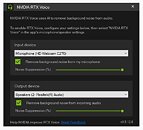Wednesday, April 22nd 2020

NVIDIA RTX Voice Modded to Work on Non-RTX GeForce GPUs
NVIDIA made headlines with the release of its RTX Voice free software, which gives your communication apps computational noise-cancellation, by leveraging AI. The software is very effective at what it does, but requires a GeForce RTX 20-series GPU. PC enthusiast David Lake, over at Guru3D Forums disagrees. With fairly easy modifications to its installer payload, Lake was able to remove its system requirements gate, and get it to install on his machine with a TITAN V graphics card, and find that the software works as intended.
Our first instinct was to point out that the "Volta" based TITAN V features tensor cores, and has hardware AI capabilities, until we found dozens of users across Guru3D forums, Reddit, and Twitter claiming that the mod gets RTX Voice to work on their GTX 16-series, "Pascal," "Maxwell," and even older "Fermi" hardware. So in all likelihood, RTX Voice uses a CUDA-based GPGPU codepath, rather than something fancy leveraging tensor cores. Find instructions on how to mod the RTX Voice installer in the Guru3D Forums thread here.
Our first instinct was to point out that the "Volta" based TITAN V features tensor cores, and has hardware AI capabilities, until we found dozens of users across Guru3D forums, Reddit, and Twitter claiming that the mod gets RTX Voice to work on their GTX 16-series, "Pascal," "Maxwell," and even older "Fermi" hardware. So in all likelihood, RTX Voice uses a CUDA-based GPGPU codepath, rather than something fancy leveraging tensor cores. Find instructions on how to mod the RTX Voice installer in the Guru3D Forums thread here.

30 Comments on NVIDIA RTX Voice Modded to Work on Non-RTX GeForce GPUs
I bet the AI is mostly mad at us for being abused for marketing goals. Good to know that a bunch of shaders now represents a neural network!
CUDA API falls back to non-tensor execution when tensor cores aren't available. Which means code written with tensor math enabled will work on any other GPU that supports all the instructions - just a lot slower.
The simple thing to do is check how much GPU load RTX Voice generated on non-tensor chips.Who is "we" in this paragraph?No. It uses CUDA API. There are tricks for running CUDA on AMD, but you'd have to recompile the program.
As said in the other topic about RTX Voice... when it comes to audio solutions... 99% smoke and mirrors. The wheel was already invented a few million times now.
Because we all know that CS gamers cant use it if they can't run at 10000FPS while using it :D but all fun aside my 4K gaming cant really handle 10% gpu load from a voice program..
but can i put my spare GTX970 in and run it off that and then game on my 1080TI ? maybe nvidia actually did it,envented something that can use a spare GTX :) Sorry Nvidia.. RTX... i will not hax your software and stay true to the GREEN GIANT.... :D
Just tried it, took approx 1 second to be applied to a 3 minutes long 2 channel audio file, taking a single core to 99%). Of course RTX Voice is real time (computationally more demanding), as is probably a bit more complex. Probably the algorithm is similar, except the RTX voice analyses the sound input stream several times per second to "learn" the noise profile and remove it from the output stream.
Not that I understand much about it, but I suspect that noise reduction uses FFT which should be a breeze to do on GPU compute cores.
EDIT: I think the ones who said that RTX Voice can run on Fermi GPUs may have gotten it confused with Kepler. Fermis support up to Compute 2.1.
So what is most likely happening with RTX Voice is that it does access the Tensor Cores first and if its not available, use the normal shaders. Machine learning can definitely be used for audio processing, especially if it leverages Tensor Cores for more performance.
Rtx this Rtx that ,Rtx does little. . ..... .
There is even a dl link with pre modded exe.
forums.guru3d.com/threads/nvidia-rtx-voice-works-without-rtx-gpu-heres-how.431781/
Insignificant load on GTX 1080. 3% load on base clock frequency
Clocks:
So even IF it did use tensors it is not using much I would imagine.
Barrel scraping at its best, by Nvidia for Rtx selling features I mean.
Nvidia software engineer: Hey look, I made a nice noise-suppression program, and it can even use tensor cores to reduce system load. Let's offer it as a nice bonus to all loyal customers, even ones with 5-8 year old cards.
Nvidia marketing: Nah, let's release it and make it so it doesn't install unless have RTX graphics card.
Fun fact, I saw one 'load spike'... when I opened the snipping tool :D 5% load. Played with the suppression sliders, no noticeable changes. Varied in volume (whisper vs loud music background), no change.
The run starts when you see the core clock jump to base clock. I like how it stays away from the OC clocks. Also of note, I run a 120hz panel, so my idle clock is already a tiny bit higher. But no funny P state business... Nvidia had its problems with high refresh screens and idle clocks at one point.
I might keep this app. It requires no login so I guess this modded version is here to stay. The noise suppression is actually quite good.I didn't see much fanboying on this subject, rather a flood of 'ohnoesmuhtelemetryandspying' when in fact it runs locally :)
The more noticeable thing was the instant suspicion of users thinking this could never be tensor core only...and here we are :D
If RTX had real value, they wouldn't keep trying to make up problems to solve. Probably ought to have used that real estate on the GPU on more GPU rather than Tensor cores few games use (and fewer still use well.) Hopefully, they'll right the ship with their fab update coming later this year.
www.nvidia.com/en-us/geforce/guides/nvidia-rtx-voice-setup-guide/